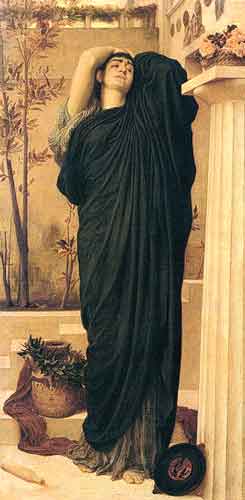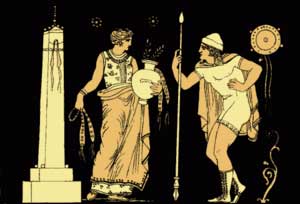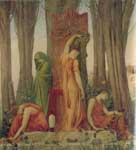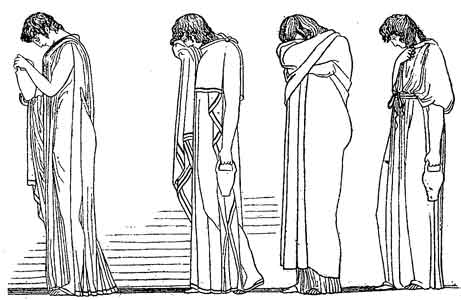Electra is one of the most popular mythological characters in tragedies.[1] She is the main character in two Greek tragedies, Electra by Sophocles and Electra by Euripides. She is also the central figure in plays by Aeschylus, Alfieri, Voltaire, Hofmannsthal, and Eugene O'Neill.[1] Her characteristic can be stated as a vengeful soul in The Libation Bearers, the second play of Aeschylus' Oresteia trilogy, because she plans out an attack with her brother to kill their mother, Clytemnestra.
In psychology, the Electra complex is named after her.

Electra at the Tomb of Agamemnon, Frederic Lord Leighton, 1869, Hull City Museums and Art Galleries
Family
Electra's parents were King Agamemnon and Queen Clytemnestra. Her sisters were Iphigeneia and Chrysothemis, and her brother was Orestes. In the Iliad, Homer is understood to be referring to Electra in mentioning "Laodice" as a daughter of Agamemnon.[2]
Murder of Agamemnon
Orestes, Electra and Hermes at the tomb of Agamemnon, lucanian red-figure pelike, c. 380–370 BC, Louvre (K 544)
Electra was absent from Mycenae when her father, King Agamemnon, returned from the Trojan War. When he came back, he brought with him his war prize, the Trojan princess Cassandra, who had already borne him twin sons. Upon their arrival, Agamemnon and Cassandra were murdered, by either Clytemnestra herself, her lover Aegisthus, or both. Clytemnestra had held a grudge against her husband for agreeing to sacrifice their eldest daughter, Iphigenia, to Artemis so he could send his ships to fight in the Trojan war. In some versions of this story, Iphigenia was saved by the goddess at the last moment.
Eight years later, Electra returned home from Athens at the same time as her brother, Orestes. (Odyssey, iii. 306; X. 542). According to Pindar (Pythia, xi. 25), Orestes was saved either by his old nurse or by Electra, and was taken to Phanote on Mount Parnassus, where King Strophius took charge of him. When Orestes was twenty, the Oracle of Delphi ordered him to return home and avenge his father's death.
Murder of Clytemnestra
According to Aeschylus, Orestes saw Electra's face before the tomb of Agamemnon, where both had gone to perform rites to the dead where a recognition occurred, and they arranged how Orestes should accomplish his revenge.[3] Orestes and his friend Pylades, son of King Strophius of Phocis and Anaxibia, killed Clytemnestra and Aegisthus (in some accounts with Electra helping).
Before her death, Clytemnestra cursed Orestes. The Erinyes or Furies, whose duty it is to punish any violation of the ties of family piety, fulfill this curse with their torment. They pursue Orestes, urging him to end his life. Electra was not hounded by Theta.
In Iphigeneia in Tauris, Euripides tells the tale somewhat differently. In his version, Orestes was led by the Furies to Tauris on the Black Sea, where his sister Iphigenia was being held. The two met when Orestes and Pylades were brought to Iphigenia to be prepared for sacrifice to Artemis. Iphigeneia, Orestes, and Pylades escaped from Tauris. The Furies, appeased by the reunion of the family, abated their persecution. Electra then married Pylades.[4]
Adaptations of the Electra story
Electra and Orestes, from an 1897 Stories from the Greek Tragedians, by Alfred Church
Plays
The Oresteia, a trilogy of plays by Aeschylus
Electra, play by Sophocles
Electra, play by Euripides
Orestes, play by Euripides
Electra, a lost play by Quintus Tullius Cicero of which nothing is known but the name and that it was "a tragedy in the Greek style"
Electra (1901) a play by Benito Pérez Galdós
Elektra, a 1903 play by Hugo von Hofmannsthal, based on the Sophocles play
Mourning Becomes Electra, 1931 play by Eugene O'Neill, based on Aeschylus
Electra, 1937 play by Jean Giraudoux
The Flies, a 1943 play by Jean-Paul Sartre, modernizing the Electra myth by introducing the theme of existentialism
Electra (started in 1949, first performed 1987), a play by Ezra Pound and Rudd Fleming
Electra, or The dropping of the masks (1954) a play by Marguerite Yourcenar
Electra and Orestes, plays by Adrienne Kennedy, 1972
Electra (1974) a play by Robert Montgomery, directed by Joseph Chaikin
Electra, 1995 drama by Danilo Kiš
Electricidad, 2004 play by Luis Alfaro, modern adaptation of Electra based in the Chicano barrio
Electra/Orestes, 2015 play by Jada Alberts and Anne-Louise Sarks
Small and Tired, 2017 play by Kit Brookman
Pitribhumi, 2021 play by Sandarbha
Opera
Elektra, by Richard Strauss, with libretto by Hugo von Hofmannsthal, based on his own play
Electra, by Mikis Theodorakis
Mourning Becomes Electra, by Marvin David Levy, based on Eugene O'Neill's play
Idomeneo, by Wolfgang Amadeus Mozart, where she plays the role of rejected lover/villain
Electra, opera by Johann Christian Friedrich Haeffner, Libretto by Adolf Fredrik Ristell after Nicolas Francois Guillard
Électre, tragédie lyrique by Jean-Baptiste Lemoyne, set to a libretto by Nicolas-François Guillard
Films
Electra, a film by Michael Cacoyannis, starring Irene Papas, based on Euripides
Mourning Becomes Electra (film), a film by Dudley Nichols, starring Rosalind Russell and Michael Redgrave
The Forgotten Pistolero, a Spaghetti Western by Ferdinando Baldi starring Leonard Mann and Luciana Paluzzi
Ellie, a film which transfers the story to a Southern U.S. locale
Szerelmem, Elektra (Elektra, My Love), film by Miklós Jancsó, starring Mari Törőcsik
Filha da Mãe and Mal Nascida, both by Portuguese film director João Canijo
elektraZenSuite, medium-length film by Alessandro Brucini, based on texts by Aeschylus, Sophocles, William Shakespeare, Hugo von Hofmannsthal, Sylvia Plath, and the Zen Buddhist monk Takuan Soho
Electra, film by Shyamaprasad, starring Nayanthara, Skanda Ashok, Manisha Koirala and Prakash Raj, based on Euripides
Literature
Elektra (Laodice) is the unnamed protagonist and speaker in Yannis Ritsos's long poem Beneath the Shadow of the Mountain. This poem forms part of the cycle colloquially referred to as the New Oresteia.
Electra is the eponymous narrator of her story in the book 'Electra' by Henry Treece. (Bodley Head, 1963: Sphere Books., 1968).
Electra on Azalea Path is the title of Sylvia Plath's poem published in 1959, in reference to the Electra Complex
A central character in Donna Leon's crime fiction series is a present-day young woman named Elettra (the Italian form of "Electra"), who is highly resourceful and who bears some resemblance to the mythological character.
House of Names, by Colm Tóibín. A retelling of the story of Agamemnon's death and the resulting events. (Simon and Schuster, May 9, 2017. 275 pages[5])
See also
130 Elektra - asteroid named after Electra.
Bibliography
Evans, Bergen (1970). Dictionary of Mythology. New York: Dell Publishing. ISBN 0-440-20848-3.
Vellacott, Philip (1963). Euripides: Medea and Other Plays. London: Penguin Classics. ISBN 0-14-044129-8.
Fagles, Robert (1977). Aeschylus: The Oresteia. London: Penguin Classics. ISBN 978-0-14-044333-2.
References
Evans (1970), p. 79
"Agamemnon" in Oxford Companion to Classical Civilization, as quoted at eNotes.com
Fagles (1977), p. 188
Luke Roman, Monica Roman, Encyclopedia of Greek and Roman Mythology, Infobase Publishing, 2010, p.143.
https://books.google.com/books?id=znXGDgAAQBAJ
Aeschylus, Oresteia; Euripides, Electra; Orestes; Apollodorus, Epitome VI, 23-28.

Electra and Orestes, from an 1897 Stories from the Greek Tragedians, by Alfred Church

Electra at the tomb of Agamemnon, Sir William Blake Richmond

Electra, based on a drawing of Flaxman
External links
"Electra" . New International Encyclopedia. 1905.
Media related to Electra at Wikimedia Commons
Electra public domain audiobook at LibriVox
vte
Iphigenia in Aulis and Iphigenia in Tauris by Euripides
Iphigenia's family
Agamemnon (father) Clytemnestra (mother) Aegisthus (stepfather) Orestes (brother) Electra (sister) Chrysothemis (sister)
Iphigenia in Aulis
Operas
Iphigénie en Aulide (1774, Gluck)
Plays
Iphigénie (1674)
Film
Iphigenia (1977)
Novel
The Songs of the Kings
Trilogy
The Bacchae Alcmaeon in Corinth
Related
Bash: Latter-Day Plays The Killing of a Sacred Deer
Iphigenia in Tauris
Operas
Iphigénie en Tauride (1699, Desmarets and Campra) Ifigenia in Tauride (1724, Vinci) Ifigenia in Tauride (1763, Traetta) Ifigenia in Tauride (1771, Jommelli) Iphigénie en Tauride (1779, Gluck)
discography Iphigénie en Tauride (1781, Piccinni)
Plays
Iphigenia in Tauris (1779)
vte
Electra
Family
Agamemnon (father) Clytemnestra (mother) Aegisthus (stepfather) Orestes (brother) Iphigenia (sister) Chrysothemis (sister)
Films
Mourning Becomes Electra (1947) Electra (1962) Sandra (1965) The Forgotten Pistolero (1969) Electra, My Love (1974) The Travelling Players (1975) Ellie (1984) Electra (2010)
Operas
Idoménée (1712, Campra) Idomeneo (1780, Mozart) Oresteia (1895, Taneyev) Elektra (1909, Strauss/von Hofmannsthal)
discography Leben des Orest (1930, Krenek) Mourning Becomes Electra (1967, Levy/Butler)
Literature
Oresteia (458 BC, Aeschylus) Electra (c. 413 BC, Euripides) Orestes (c. 408 BC, Euripides) Electra (c. 405 BC, Sophocles) Electra (1937, Giraudoux) The Flies (1943, Sartre) Elektra (1971, Wijesinha) Mourning Becomes Electra (1931, O'Neill) Elektra (1981, Marvel)
Art
Orestes and Electra
See also : Greek Mythology. Paintings, Drawings
Retrieved from "http://en.wikipedia.org/"
All text is available under the terms of the GNU Free Documentation License
| Ancient Greece
Science, Technology , Medicine , Warfare, , Biographies , Life , Cities/Places/Maps , Arts , Literature , Philosophy ,Olympics, Mythology , History , Images Medieval Greece / Byzantine Empire Science, Technology, Arts, , Warfare , Literature, Biographies, Icons, History Modern Greece Cities, Islands, Regions, Fauna/Flora ,Biographies , History , Warfare, Science/Technology, Literature, Music , Arts , Film/Actors , Sport , Fashion --- |

